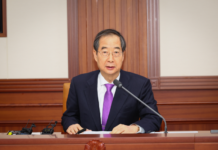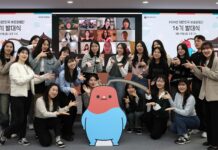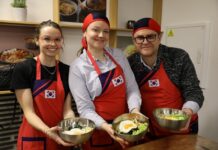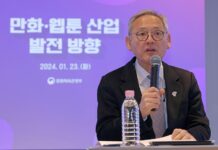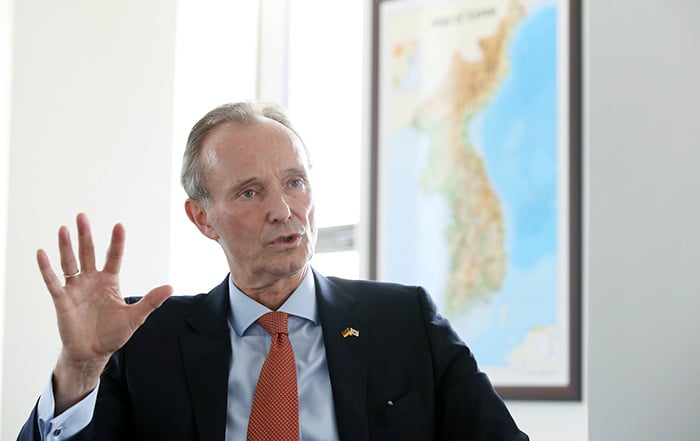
German Ambassador to Korea Stephan Auer emphasizes the potential growth of Korea-Germany cooperation, during an interview with Korea.net in Seoul on June 21.
By Yoon Sojung and Min Yea-Ji
Photos = Jeon Han
Seoul | June 21, 2017
“People-to-people exchanges were the foundation that led to the development of Korea-Germany relations.”
So said German Ambassador to Korea Stephan Auer, highlighting the past, present and future of the bilateral relationship.
“Human exchanges between our countries began 134 years ago. In the 1960s, Korea dispatched some 20,000 miners and nurses to Germany. Such human exchanges became the backbone of the growth of our bilateral ties,” he said.
When questioned about the bilateral relationship today, Ambassador Auer first mentioned Paul Georg von Möllendorff (1848-1901) who became a high-profile official in the Joseon court in the bureau that was equivalent to today’s foreign ministry. Since then, the Korea-German relationship has developed quite a lot, he said, stretching to the first-ever dispatch of a special envoy to Germany and to the EU this past May by President Moon Jae-in.
“The unification of Germany is also one example that showed the importance and effect of people-to-people exchanges,” said the German ambassador.
“It was people themselves who led the unification of Germany,” he emphasized.
“Citizens of both East and West Germany were able to travel and communicate with each other, and while doing so, in the eyes of East German citizens, human rights, democracy, freedom, and the open economy that the West German people enjoyed looked quite attractive,” said the ambassador.
He also pointed out that the Ostpolitik of former Chancellor Willy Brandt (1913-1992), who opened the era of exchange with East Germany, and the continued efforts by former Chancellor Helmut Kohl (1930~2017), who is dubbed as the “father of German unification,” were both important factors that eventually led to unification.

Ambassador Stephan Auer says that Korea first needs to look into the differences in terms of circumstances between Korea and Germany in order to learn lessons from German unification.
Stressing the significance of the upcoming Korea-Germany summit in Berlin and the G20 summit in Hamburg, the ambassador said hopefully, “Both countries will be able to expand cooperation on many areas, including politics, the economy and the fourth industrial revolution.”
“In the G20 Summit in Hamburg, the two countries will be able to play a larger role in cooperation on global issues, including sustainable development, climate change and free trade,” said Ambassador Auer.
“The German federal government selected sustainability, responsibility and cooperation as the three keywords of the upcoming G20 Summit,” he noted.
The German ambassador also added that the African Partnership will be introduced for the first time at this year’s G20 Summit.
Introducing the G20 Summit host city, Hamburg, Ambassador Auer said, “Hamburg is our gate to the world.”
“As a port city, it symbolizes openness, tolerance, trade and open markets.”
“As the city meets the ocean, Hamburg is also a place where we can see the rise of sea levels due to global warming,” he said.
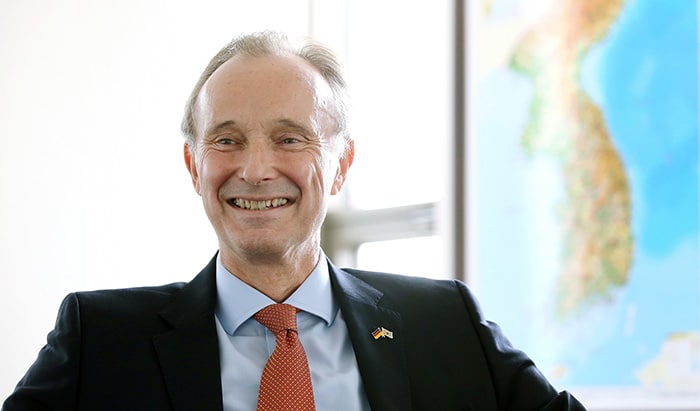
Ambassador Stephan Auer says that he loves bibimbap mixed rice and bulgogi marinated beef, two of his favorite Korean foods. He also recommended that people enjoy schweinebraten, a type of pork roast, with German beer, a must-eat German specialty.
The German ambassador said that he has enjoyed both bibimbap mixed rice and bulgogi marinated beef over his 10 months so far in Korea. He also expressed his fondness for the Korea-style community lifestyle, where people enjoy food and share affinity together.
When asked about his favorite attractions, Ambassador Auer picked Gyeongju, the capital of Korea’s ancient Silla Kingdom, Namhae, where Korea’s German Village is located, and Seoul, which represents the dynamism of Korea, along with the Panmunjeom Truce Village. Speaking about Panmunjeom, he said that that place has special meaning for Germans as they also experienced the pains of national division.
Speaking of German cuisine, he said with a smile that, “You must eat schweinebraten, a type of pork roast, with German beer. It’s fantastic.”
He also advised people to choose either places or festivals when planning a trip to Germany.
As for places, he recommended Dresden, calling the city “a jewel of a city,” and Regensburg, a city of medieval relics that is also a UNESCO World Heritage Site.
Regarding festivals, he mentioned Oktoberfest, which takes place in September in Munich, the Christmas Market, which is held in late November for a whole month in Nuremberg, and Carnival, which is held from November to March in Cologne and Dusseldorf.
Talking for almost one hour about various topics involving Korea and Germany, Ambassador Auer finally told Korea.net that, “As we have a lot of fake news today, Korea.net offers real news in almost all areas, ranging from government policies, the economy, the arts, society and even sports, and all that news in nine languages.”
“I hope that Korea.net can continue to play an important role as a media outlet that readers can truly trust,” he added. German Ambassador to Korea Stephan Auer emphasizes the potential growth of Korea-Germany cooperation, during an interview with Korea.net in Seoul on June 21. By Yoon Sojung and Min Yea-Ji Photos = Jeon Han Seoul | June 21, 2017 “People-to-people exchanges were the foundation that led to the development of Korea-Germany relations.” So said German Ambassador to Korea Stephan Auer, highlighting the past, present and future of the bilateral relationship. “Human exchanges between our countries began 134 years ago. In the 1960s, Korea dispatched some 20,000 miners and nurses to Germany. Such human exchanges became the backbone of the growth of our bilateral ties,” he said. When questioned about the bilateral relationship today, Ambassador Auer first mentioned Paul Georg von Möllendorff (1848-1901) who became a high-profile official in the Joseon court in the bureau that was equivalent to today’s foreign ministry. Since then, the Korea-German relationship has developed quite a lot, he said, stretching to the first-ever dispatch of a special envoy to Germany and to the EU this past May by President Moon Jae-in. “The unification of Germany is also one example that showed the importance and effect of people-to-people exchanges,” said the German ambassador. “It was people themselves who led the unification of Germany,” he emphasized. “Citizens of both East and West Germany were able to travel and communicate with each other, and while doing so, in the eyes of East German citizens, human rights, democracy, freedom, and the open economy that the West German people enjoyed looked quite attractive,” said the ambassador. He also pointed out that the Ostpolitik of former Chancellor Willy Brandt (1913-1992), who opened the era of exchange with East Germany, and the continued efforts by former Chancellor Helmut Kohl (1930~2017), who is dubbed as the “father of German unification,” were both important factors that eventually led to unification. Ambassador Stephan Auer says that Korea first needs to look into the differences in terms of circumstances between Korea and Germany in order to learn lessons from German unification. Stressing the significance of the upcoming Korea-Germany summit in Berlin and the G20 summit in Hamburg, the ambassador said hopefully, “Both countries will be able to expand cooperation on many areas, including politics, the economy and the fourth industrial revolution.” “In the G20 Summit in Hamburg, the two countries will be able to play a larger role in cooperation on global issues, including sustainable development, climate change and free trade,” said Ambassador Auer. “The German federal government selected sustainability, responsibility and cooperation as the three keywords of the upcoming G20 Summit,” he noted. The German ambassador also added that the African Partnership will be introduced for the first time at this year’s G20 Summit. Introducing the G20 Summit host city, Hamburg, Ambassador Auer said, “Hamburg is our gate to the world.” “As a port city, it symbolizes openness, tolerance, trade and open markets.” “As the city meets the ocean, Hamburg is also a place where we can see the rise of sea levels due to global warming,” he said. Ambassador Stephan Auer says that he loves bibimbap mixed rice and bulgogi marinated beef, two of his favorite Korean foods. He also recommended that people enjoy schweinebraten, a type of pork roast, with German beer, a must-eat German specialty. The German ambassador said that he has enjoyed both bibimbap mixed rice and bulgogi marinated beef over his 10 months so far in Korea. He also expressed his fondness for the Korea-style community lifestyle, where people enjoy food and share affinity together. When asked about his favorite attractions, Ambassador Auer picked Gyeongju, the capital of Korea’s ancient Silla Kingdom, Namhae, where Korea’s German Village is located, and Seoul, which represents the dynamism of Korea, along with the Panmunjeom Truce Village. Speaking about Panmunjeom, he said that that place has special meaning for Germans as they also experienced the pains of national division. Speaking of German cuisine, he said with a smile that, “You must eat schweinebraten, a type of pork roast, with German beer. It’s fantastic.” He also advised people to choose either places or festivals when planning a trip to Germany. As for places, he recommended Dresden, calling the city “a jewel of a city,” and Regensburg, a city of medieval relics that is also a UNESCO World Heritage Site. Regarding festivals, he mentioned Oktoberfest, which takes place in September in Munich, the Christmas Market, which is held in late November for a whole month in Nuremberg, and Carnival, which is held from November to March in Cologne and Dusseldorf. Talking for almost one hour about various topics involving Korea and Germany, Ambassador Auer finally told Korea.net that, “As we have a lot of fake news today, Korea.net offers real news in almost all areas, ranging from government policies, the economy, the arts, society and even sports, and all that news in nine languages.” “I hope that Korea.net can continue to play an important role as a media outlet that readers can truly trust,” he added.



